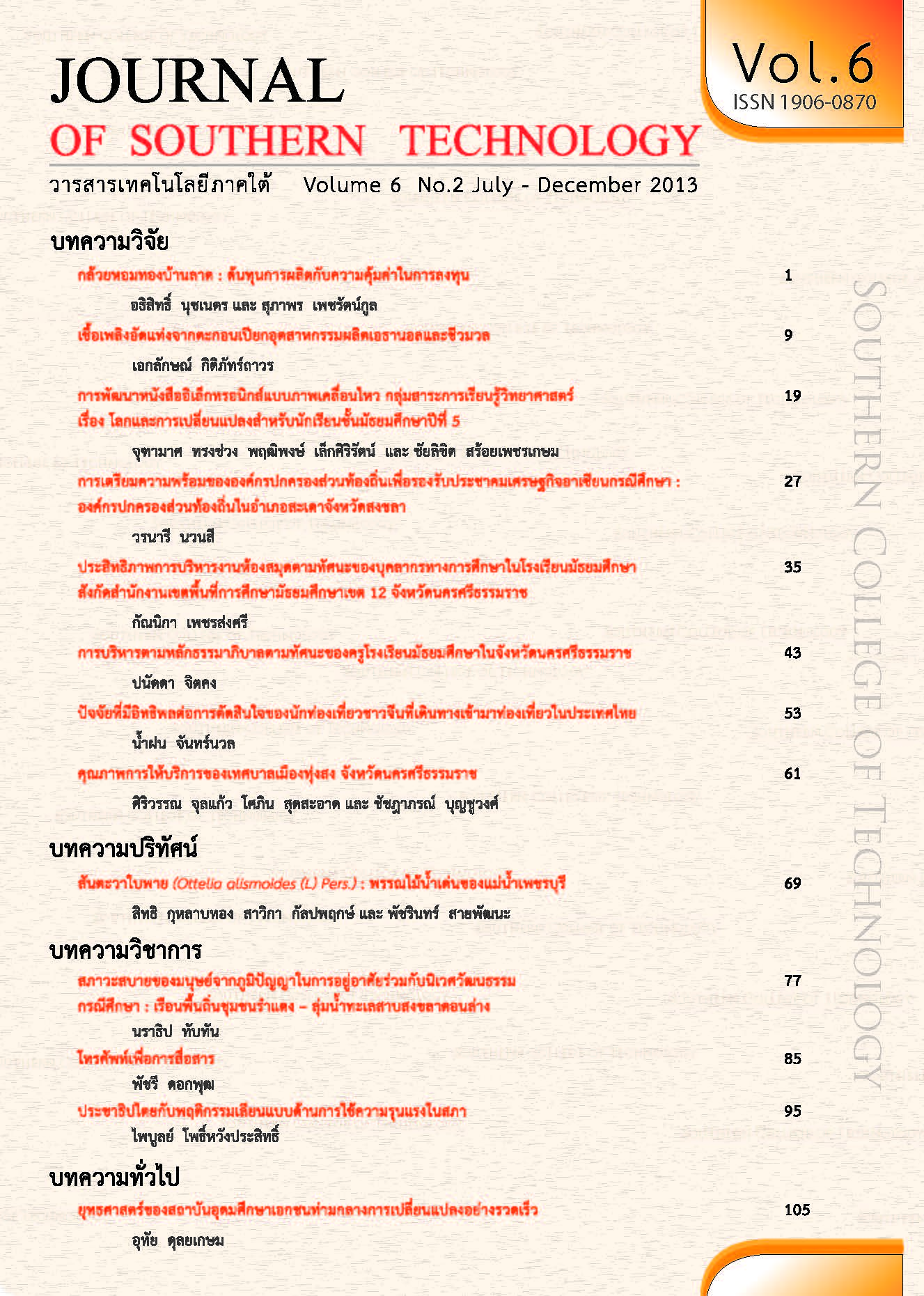การบริหารตามหลักธรรมาภิบาลตามทัศนะของครูโรงเรียนมัธยมศึกษา ในจังหวัดนครศรีธรรมราช
Main Article Content
Abstract
การวิจัยนี้มีวัตถุประสงค์ เพื่อศึกษาและเปรียบเทียบการบริหารตามหลักธรรมาภิบาลตามทัศนะของครูโรงเรียนมัธยมศึกษาในจังหวัดนครศรีธรรมราช หลักธรรมาภิบาลประกอบด้วย หลักนิติธรรม หลักคุณธรรม หลักความโปร่งใส หลักการมีส่วนร่วม หลักความรับผิดชอบ และหลักความคุ้มค่า กลุ่มตัวอย่างที่ใช้ในการวิจัย คือ ครูโรงเรียนมัธยมศึกษา จำนวน 341 คน ได้มาโดยการสุ่มแบบแบ่งชั้นตามขนาดโรงเรียน เก็บรวบรวมโดยใช้แบบสอบถาม แบบประมาณค่า 5 ระดับที่มีค่าความเชื่อมั่นทั้งฉบับ เท่ากับ 0.93 สถิติที่ใช้ในการวิเคราะห์ข้อมูล คือ ค่าเฉลี่ย ค่าเบี่ยงเบนมาตรฐาน การวิเคราะห์ความแปรปรวนทางเดียว และการเปรียบเทียบพหุคูณด้วยวิธี LSD
ผลการวิจัยปรากฏว่า ครูมีทัศนะต่อการบริหารตามหลักธรรมาภิบาลโดยภาพรวมอยู่ในระดับปานกลาง ด้านที่มีค่าเฉลี่ยสูงสุดคือด้านหลักความคุ้มค่า เมื่อจำแนกเป็นรายด้านอยู่ในระดับดี 2 ด้าน คือด้านหลักความคุ้มค่า และด้านหลักคุณธรรม ระดับปานกลาง 4 ด้าน โดยเรียงค่าเฉลี่ยจากมากไปหาน้อยดังนี้ ด้านหลักความโปร่งใส ด้านหลักความรับผิดชอบ ด้านหลักนิติธรรม และด้านหลักการมีส่วนร่วม ครูที่มีเพศต่างกันมีทัศนะต่อการบริหารตามหลักธรรมาภิบาลโดยรวมและรายด้านไม่แตกต่างกัน ครูที่มีวุฒิการศึกษาต่างกันมีทัศนะต่อการบริหารตามหลักธรรมาภิบาลโดยรวมไม่แตกต่างกัน เมื่อพิจารณาเป็นรายด้านพบว่ามีความแตกต่างในด้านหลักนิติธรรมและด้านหลักความโปร่งใสอย่างมีระดับนัยสำคัญทางสถิติที่ระดับ .05 ครูที่มีประสบการณ์การทำงานต่างกันมีทัศนะต่อการบริหารตามหลักธรรมาภิบาล โดยรวมไม่แตกต่างกัน เมื่อพิจารณาเป็นรายด้านพบว่าแตกต่างในด้านหลักความคุ้มค่าอย่างมีนัยสำคัญทางสถิติที่ระดับ .001 และครูที่มีตำแหน่งวิทยฐานะต่างกันมีทัศนะต่อการบริหารตามหลักธรรมาภิบาลโดยรวมและรายด้านแตกต่างกันทุกด้านอย่างมีนัยสำคัญทางสถิติที่ระดับ .001 และครูที่ปฏิบัติงานในโรงเรียนที่มีขนาดต่างกันมีทัศนะต่อการบริหารตามหลักธรรมาภิบาลโดยรวมและรายด้านแตกต่างกันทุกด้านอย่างมีนัยสำคัญทางสถิติที่ระดับ .001
Perceptions of Good Governance Administrator of the Secondary Schools Teachers in Nakhon Si Thammarat
The objectives of this study were to study and compare the secondary school teachers’ perceptions towards good governance administration in Nakhon Si Thammarat. Good governance administration included six of the following principles: legal justice, integrity, transparency, cooperation, responsibility, and worthiness. The sample of 341 secondary school teachers were selected using stratified random sampling by school size. A five-level rating scale questionnaire composing three parts of questions including questions related to personal characteristics perceptions of good governance administration, and recommendations for future administration development. The overall reliability of the questionnaire was 0.93. The statistics used in analyzing the data were arithmetic mean, standard deviation, one-way ANOVA, and LSD multiple comparisons.
It revealed that in overall, the teachers ranked good governance administration at a moderate level whereby worthiness had the highest mean score. When analyzing each aspect, worthiness and integrity principles were rated as good level while the other four aspects were moderately rated: transparency, responsibility, legal justice, and cooperation respectively. The perceptions of the overall good governance administration in relevance to gender and educational levels were found no significant difference. However, a significant difference among educational levels was found in the aspects of legal justice and transparency at .05 level. Teachers with different experiences did not differ in their perceptions of overall good governance administration. Nevertheless, the difference was found in the aspect of worthiness at .001 level of significance. Furthermore, teachers with different academic levels and worked at different school sizes had different perceptions of the overall good governance administration as a whole and as an individual aspect. These differences were statistically significant at .001 level.
Article Details
-
Authors must agree to the journal publication rules and allow the editors to edit the manuscripts for publication.
-
Author’s right belongs to the author but Journal of Southern Technology holds the right of first publication and thus allow readers to use the article for the purpose of education but not commercial.

